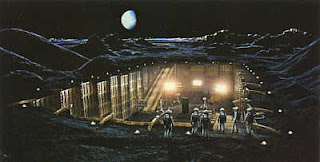 |
| What might we find, hiding under our noses? |
I like this possibility. Given the enormity of the Universe, it makes a kind of sense that any aliens who may have visited, will have done so during the early 'hours' that our planet has existed with life, rather than last few 'seconds' in which humanity popped up.
If aliens visited our solar system and found our planet, seeing its clear potential to harbour intelligent life one day, it seems logical that they would leave some sign for us to discover at a later point. As in the film, it would make sense for such a sign to be located somewhere that we can only reach with reasonably advanced space-faring technology (For now, I won't get into the idea that they may have influenced our development). It's almost pointless discussing what it could be, because it could be anything. A ruin, a buried object with an obvious radioactive or magnetic halo to signal its presence on a planet or moon, a lifeless floating spaceship, or asteroid core... Who knows? The point being that it would be reasonably obvious to find once we had the required technology to look for it. The question, is what level of technology the species in question thought was required.
Taking a Step Back
 |
| Will we ever get back here? |
As always, the excuse is 'wasted' money. I don't want to get on my high-horse, but it's too easy for politicians to cancel expensive projects related to space exploration. Average Joe Public doesn't care, because he or she does not see immediate benefits. Politicians in turn do not want to look at the wider picture, when their terms of office are so fleeting. They want to keep Joe Public happy for those small handful of years required to get back into office. How better, than to loudly announce the cancellation of space exploration projects that sound horrendously expensive (Never mind that they're usually a drop in the ocean compared to money wasted in other areas). Given the politically correct high-horse Joe Public likes to be on, he or she can look at space exploration, and say “Why are we wasting money in space, when we should be spending it fixing our problems here?”
People can also say “What's the point in going back to the moon?” Like any long-term project, the benefits may not be immediately apparent, but it would be the first step to getting humanity back out into a wider universe (forgetting the research and knowledge we would gain even on this small venture). Of course the lack of immediate benefit, especially for manned space travel, means the public tend to think: “Pah, stop wasting money! Just send probes! And we'll cut the money on them, too!”
Politicians and Joe Public will never consider that we're on a small planet, to which numerous disasters could occur at any time. We have all our eggs in one basket, and if something happens on a large enough scale, it could easily be goodbye to the human race. Of course, those issues all seem like the stuff of science fiction or scientific scaremongering that won't occur in our lifetime. So the world carries on, oblivious and caring less and less about space exploration.
What does this mean? That we're very unlikely to get out into our solar system, to even have a chance of finding signs left by another race. In my personal opinion, we'll be lucky if humanity makes it back to the moon this century, let alone anywhere else. It's possible that private industry, through financing anything from tourism to the gathering new raw materials, may be the area to make the big changes, but we'll have to wait and see. Big Business doesn't like to invest unless they can see clear progress, and space exploration isn't really an area that can make progress without big funding in the first place. It's a vicious circle. Luckily there are a few entrepreneur's such as Richard Branson, who are visionary enough to buck the trend, and fund research. Let's just hope they get somewhere.
Any Other Chances?
 |
| Might we discover something akin to what we hoped the 'Face on Mars' was going to be? |
The sad truth is that in a very short time, we've lost our vision and pulled back to excruciatingly slow baby steps at our current point in history. Apart from the forms of probe mentioned above (which are themselves suffering increasing budget cuts), as a species we're doing very little to get out there. We're becoming increasingly insular and short sighted. Goals are always set in the near future, to ensure financing and public acceptance. We've stopped being a race that dreams of greatness in our children's future, in exchange for brooding self-blame and dwelling on the transitory. In short, while I find it quite probable that some race has left behind signs for us to discover, I don't believe it will be something we find any time soon.
Next, we shall explore the more controversial theories... first, 'Ancient Memories'
Click here for:
Part 1 - Equations and Paradoxes
Part 2 - Signals from Beyond
Part 3 - Something Small
Part 4 - Remnants and Arefacts
Image Credit:
2001: A space Odyssey - MGM / Warner Bros.
NASA - http://www.nasaimages.org
All work is the © copyright of W.D.Lee and/or the respective companies, individuals or organisations to which the work is related. No infringement is intentional. No reproduction or copying is permitted without express permission.

No comments:
Post a Comment